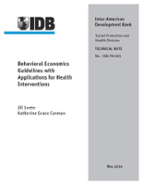Behavioral Economics Guidelines with Applications for Health Interventions
Date
May 2014
Chronic diseases have risen in prominence in recent years and are now the major cause of morbidity and mortality globally. The rise in rates of obesity and aging populations are two primary drivers of this global trend, which is predicted to continue to rise in the absence of effective interventions. Notably, much of this disease burden is due to individual behaviors such as physical inactivity, tobacco use, poor eating habits, and lack of proper preventive care. The growing field of behavioral economics combines the fields of psychology and economics to present a potentially promising new understanding of the causes for when and why people's short term decisions often undermine their long-term interests, and people's behavior deviates from a fully rational model. This paper shows how, by incorporating these insights, behavioral economics may be used to inform the design of more effective health policies and projects.



